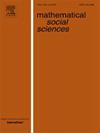Evidence disclosure with heterogeneous priors
IF 0.5
4区 经济学
Q4 ECONOMICS
引用次数: 0
Abstract
We investigate an interesting type of equilibrium of a game where a collective decision is reached by aggregating the preferred alternatives of a group of Receivers. A Sender that cares about the collective decision must make efforts (not below a normative-minimum) to gather evidence relevant for the Receivers to gauge their preferred alternatives. Research efforts may be unsuccessful, which allows for strategic concealment. Each Receiver cares only about her preferred alternative so that the goal of the Sender is achieved by affecting the beliefs of a single representative Receiver (e.g., pivotal voter). Disagreement between the players about the best alternative is based solely on heterogeneous priors. The type of equilibrium that we study arises when the Sender and the representative Receiver agree based on their priors but disagree based on some evidence. In such situations, while unfavorable evidence is concealed always, both disclosure and concealment of favorable evidence may happen with positive probability. Interestingly, for sufficiently low normative-minimum efforts, there arises a continuum of equilibria in which the Sender discloses favorable evidence with higher probability.
异质先验的证据披露
我们研究了一种有趣的博弈均衡,在这种博弈中,通过汇总一组接收者的首选方案来达成集体决策。关心集体决策的发送方必须努力(不低于规范最小值)收集与接收方相关的证据,以衡量他们的首选方案。研究工作可能不成功,这就允许策略性隐瞒。每个接受者只关心自己偏好的备选方案,因此发送者的目标是通过影响单个代表性接受者(如关键投票人)的信念来实现的。参与者之间关于最佳选择的分歧完全基于异质先验。当发送方和代表性接收方基于各自的先验达成一致,但又基于某些证据产生分歧时,就会出现我们所研究的均衡类型。在这种情况下,虽然不利证据总是被隐藏,但有利证据的披露和隐藏都可能以正概率发生。有趣的是,对于足够低的规范最小努力,会出现一个连续的均衡,其中发送方披露有利证据的概率更高。
本文章由计算机程序翻译,如有差异,请以英文原文为准。
求助全文
约1分钟内获得全文
求助全文
来源期刊

Mathematical Social Sciences
数学-数学跨学科应用
CiteScore
1.30
自引率
0.00%
发文量
55
审稿时长
59 days
期刊介绍:
The international, interdisciplinary journal Mathematical Social Sciences publishes original research articles, survey papers, short notes and book reviews. The journal emphasizes the unity of mathematical modelling in economics, psychology, political sciences, sociology and other social sciences.
Topics of particular interest include the fundamental aspects of choice, information, and preferences (decision science) and of interaction (game theory and economic theory), the measurement of utility, welfare and inequality, the formal theories of justice and implementation, voting rules, cooperative games, fair division, cost allocation, bargaining, matching, social networks, and evolutionary and other dynamics models.
Papers published by the journal are mathematically rigorous but no bounds, from above or from below, limits their technical level. All mathematical techniques may be used. The articles should be self-contained and readable by social scientists trained in mathematics.
 求助内容:
求助内容: 应助结果提醒方式:
应助结果提醒方式:


